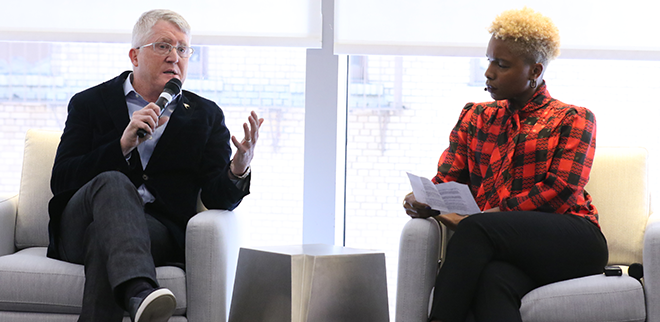
While the industry debates which currency wins, Mediaocean is busy powering the infrastructure that makes them all work. In this fireside chat at CIMM East, Ramsey McGrory chatted about why being the system of record—and staying neutral—might be the most powerful position of all.
Mediaocean might not be battling for the spotlight like the currency providers dominating headlines, but make no mistake, they’re sitting at the center of how the next phase of media measurement and transactions will work.
At CIMM East, in a fireside chat moderated by CIMM’s Tameka Kee, Mediaocean Chief Development Officer Ramsey McGrory laid out a case for the company’s role as the connective tissue of the advertising ecosystem.
The timing of this conversation couldn’t have been better.
Just two months ago, Mediaocean completed its acquisition of Innovid, bringing together Innovid and Flashtalking under one roof to create an independent, omnichannel ad tech platform.
The move solidified Mediaocean’s ambitions to provide a scaled alternative to walled-garden ad tech. The joint ad tech platform equips brands, agencies, and publishers with tools that span creative, measurement, optimization, and ad serving—all powered by AI and automation.
“We’re not planning to ever intermediate a transaction to create an exchange,” McGrory said. “Part of our value is the independence of not being a media seller or buyer, but providing the federal highway system on which people can build and run their own cars and transact.”
A Neutral Player with a Panoramic View
McGrory’s highway metaphor is foundational to Mediaocean’s pitch.
With visibility into billions in ad spend and hundreds of agencies relying on its Prisma platform, Mediaocean sits in a rare position: it doesn’t have to choose a currency, but it does have to support all of them.
Over the past two years, McGrory noted, Mediaocean has held more than 300 meetings with agencies, sellers, and currency providers, each vying for adoption. That neutral vantage point gives the company a clear understanding of what needs to happen for advanced measurement to become more than just a PowerPoint talking point.
“We’re absolutely in the position—given that we’re the system of record where transactions are finalized—that measurement, that currency-grade measurement, has to sit at the campaign and even line-item level,” McGrory said. “Thousands and thousands of reconciliations per agency have to be able to scale and happen in an automated way.”
It’s not the flashiest position, but as McGrory makes clear, being the highway means every transaction eventually runs through you.
Process Is Just as Important as Precision
Much of the conversation around currencies has focused on technical capabilities. Second-by-second measurement, panel calibration, and data modeling. But, McGrory made it clear that no matter how advanced the methodology, none of it matters unless buyers and sellers agree on the process.
And, Mediaocean is the platform where that process gets locked in.
Take exact spot measurement, for instance. Some currency providers can offer precise metrics down to the second an ad airs. But as McGrory pointed out, the system isn’t built to support that. Sellers currently submit affidavits in minutes, not seconds. Shifting that would require a massive procedural overhaul.
“As much as this is a big data problem, it is just as much a process and agreement problem,” he said. “The buyers, sellers, and currency providers have to agree on what they’re transacting against.”
The Four Vs—and the Limits of Their Role
McGrory also talked about the “four Vs” of media data: volume, velocity, variety, and veracity. Mediaocean, he explained, is deeply involved in the first three—it processes immense amounts of transactional data quickly and in many formats. But when it comes to the fourth V, veracity, the company steps back.
“Do the buyers and sellers actually agree that the data is accurate? That’s not our role,” McGrory said. Instead, he pointed to organizations like the MRC and the JIC as the entities responsible for judging accuracy and validity.
Still, that doesn’t minimize Mediaocean’s influence. As Kee noted, agencies are already coming to Mediaocean for help in operationalizing new currencies—proof that while Mediaocean may not define what’s valid, it plays a central role in facilitating transactions.
More Than Middleware
With the Innovid and Flashtalking merger finalized, Mediaocean is more than middleware—it’s now a full-stack partner offering everything from creative personalization to verification.
The company has also launched a Certified Service Partner program, deepening ties with holding companies like Interpublic, Omnicom, and WPP, which now hold minority stakes in the firm. That creates further incentives for adoption across the buy side.
Infrastructure rarely grabs headlines, but in an era of currency fragmentation, it just might be the most critical player in the room.
In the multicurrency madness, Mediaocean doesn’t need to pick a side. It just needs to make sure the roads are paved.